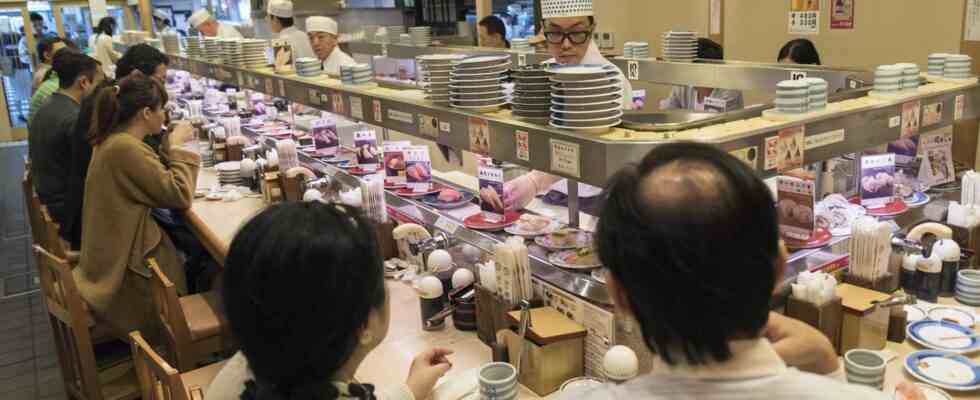Japan
“Sushi terrorism”: Disgusting videos from customers go viral – and call the police into action
Kaiten-Zushi restaurants are places where the sushi is delivered to the customer on a conveyor belt. Before the food reaches the respective guest, it passes some other customers – some of whom allow themselves nasty jokes.
© Imago Images
Would you like to eat sushi afterwards? In Japan, disgusting videos from assembly line joints have sparked a nationwide outcry. The restaurants affected by the “sushi terror” have called in the police and are rethinking their store concepts.
The media call it “unhygienic,” while people on social networks call it “sick” and “disgusting.” Videos from Japanese sushi restaurants have been circulating on Twitter, Instragam and TikTok in recent days, where customers are abusing other guests’ food in a rather disgusting way. All the incidents that went viral under the term “sushi tero” (“sushi terrorism”) occurred in restaurants where the Japanese specialty is delivered to the customer on assembly lines.
“Sushi terrorism” sparks nationwide anger
One of the shots shows a blond teenager licking the open top of a soy bottle and the rim of a teacup before returning them to the assembly line. Shot at a branch of leading sushi chain “Sushiro” in downtown Gifu, the video was first shared on an Instagram story before spreading online at breakneck speed and eventually making national and international news. The clip now has over 40 million clicks.
Similar videos appeared a little later, some with older time stamps. But the scenes are at least as repulsive. A man who puts his finger in his mouth and then touches two pieces of fish that are passing by. A customer secretly spreading wasabi on someone else’s sushi. People licking the spoon of a shared container full of green tea powder. On the other hand, the recordings in which guests steal other customers’ food from the assembly line seem almost harmless.
The operators of the bars turn on the police
The images have sparked an outcry in Japan, which is known for its high standards of cleanliness. According to the “Guardians” an estimated value of 740 billion yen (about 5.7 billion US dollars). After the blonde boy’s video was published, the shares of the parent company of “Sushiro” collapsed by almost 5 percent. The operators of the premises are alarmed and have called the police.”As a company, we will react decisively in both criminal and civil matters,” the quoted BBC the sushi chain. The blonde teenager has since apologized, but according to media reports, “Sushiro” filed a formal police complaint.
Two other chains, “Hama Sushi” and “Kura Sushi”, have also announced that they will take legal action. The former have according to “Japan Timesfiled a complaint with the police over a video that circulated in early January. The actions depicted in the videos “may amount to fraudulent business obstruction,” said Hiroaki Aratake, an attorney specializing in hospitality law. The newspaper said Kura Sushi plans to install cameras over conveyor belts to better monitor customers, and the incidents have sparked debate about whether “trust-based businesses” like assembly-line restaurants “are still alive in a frayed society.” can exist, reports the “Japan Times”.
“Terror” in gastronomy is not a new phenomenon
Conveyor belt sushi restaurants have been a staple of Japanese cuisine for decades. The restaurants affected are receiving a lot of support and encouragement. Numerous people have demonstrated their support for the restaurant chain online, including with the hashtag #saveSushiro. The company’s president, Kohei Nii, said he was overwhelmed by the sympathy and tweeted, “I’m so grateful I could cry.” Still, the videos have caused the company to reconsider how the sushi should be served. Immediately after the incident, according to the Guardian, the restaurant replaced all bottles of soy sauce and rinsed the cups again. Spices and cutlery are no longer on the tables, but should be picked up at an issue point.
tips
How do you actually recognize good sushi?
The phenomenon itself is not new. It’s just a “branch” of “Baito Tero,” “part-time job terrorism,” writes the Japan Times. This term refers to individuals who commonly engage in rude behavior in restaurants and convenience stores and have been stirring up public anger for years. With the ubiquity of smartphones and apps geared toward short attention spans, such “absurd and disruptive content” is steadily increasing. The “sushi terror” joins a wave of stupidity staged for the attention of TikTok users, the article surmises. As long as attention “is the main currency of the Internet,” the various forms of “tero” will remain trendy, the Japan Times predicts.
Sources:BBC“Japan Times” (I), “Japan Times” (II), “The Guardians“



